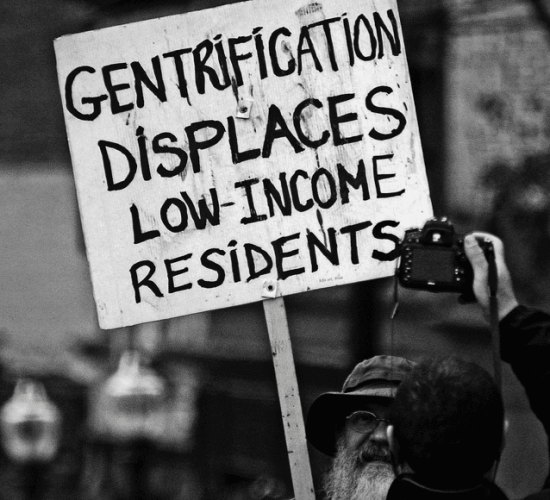During my internship in D.C., the social phenomenon that has shocked me the most is homelessness. Although this was not my first visit to the District, coming here as a temporary resident introduced me to a new, sad facet of the city. When I asked locals about what had forced that many people to experience homelessness, most pointed out that the main reason was gentrification. Living in the northwest part of the city, I wasn’t a stranger to construction, but I had never questioned how it impacted on the livelihood and well-being of the ones displaced.
Gentrification is often simply defined as the transformation of neighborhoods from low to high socioeconomic status. It is a result of urban renewal policies implemented by cities, meant to improve physical, social, and economic gain within a specified area. Despite the seemingly positive outcomes that could result from these projects (like safer streets, better mobility, improved aesthetics, and stronger social cohesion), they also accentuate a gap between affluent neighborhoods and impoverished residents.
Washington D.C. is the city with the highest intensity of gentrification in the United States of America. The staggering value increase in housing and lifestyle has caused displacement of long-time residents and businesses, who have had to move to Virginia or Maryland because of higher rents, mortgages and property taxes. In the worst-case scenario, those who cannot afford to stay or leave find themselves on the streets or in local parks.
Even though it may seem like the deleterious effects of gentrification are crystal clear, there is still a lack of empirical research linking gentrification to health problems, or even on how gentrification is operationalized. Moreover, there is a lack of consensus on the appropriateness of any single definition of gentrification or on its exact parameters of measurement, which makes comparative studies considerably difficult.
 However, new studies show that gentrification can lead to negative effects on social and physical environments, and ultimately health. Thus, there are some factors to consider in order to be able to draw conclusions on the relationship between gentrification and health.
However, new studies show that gentrification can lead to negative effects on social and physical environments, and ultimately health. Thus, there are some factors to consider in order to be able to draw conclusions on the relationship between gentrification and health.
First, at the core of gentrification, displacement and resettlement generate short and long-term impacts on health. The short-term impacts are associated to higher stress levels from the disruptions of daily activities and social networks. The long-term negative health effects are related to limited housing choices often located in neighborhoods with higher crime rates, less access to healthy foods and fewer education and employment opportunities.
Gentrification also exacerbates disparities amongst residents. In addition to low-income populations, there other groups that are vulnerable including seniors, households led by single-parents and populations of color who are more likely to experience gentrification. Residents often face discrimination and stigmatization both before and after displacement, which hinders the possibilities of resettling and results in poorer mental health due to depression and anxiety. Furthermore, these vulnerable populations are more likely to have shorter life expectancies, higher infant mortality, and increased cancer, asthma, diabetes and cardiovascular disease rates.
The adverse impacts of gentrification on health are even more evident for people facing homelessness, whose lack of dwelling negatively influences their access to proper hygiene and nourishment. Consequently, they are more prone to physical and mental illness and less likely to receive suitable medical attention.
In spite of the described ramifications of gentrification, more research has to be conducted in order to fully assess its impact on health. The findings so far portray a complex reality that includes the cumulative effects of different factors. Future studies should build on this relation by providing further evidence on how, why, and under what circumstances gentrification could potentially affect health. But for now, let’s answer the question: is a gentrified city a healthy city? It apparently depends on how wealthy you are.
Image: https://edlanta.org/2017/03/gentrification-displace-low-income-students-residents/



